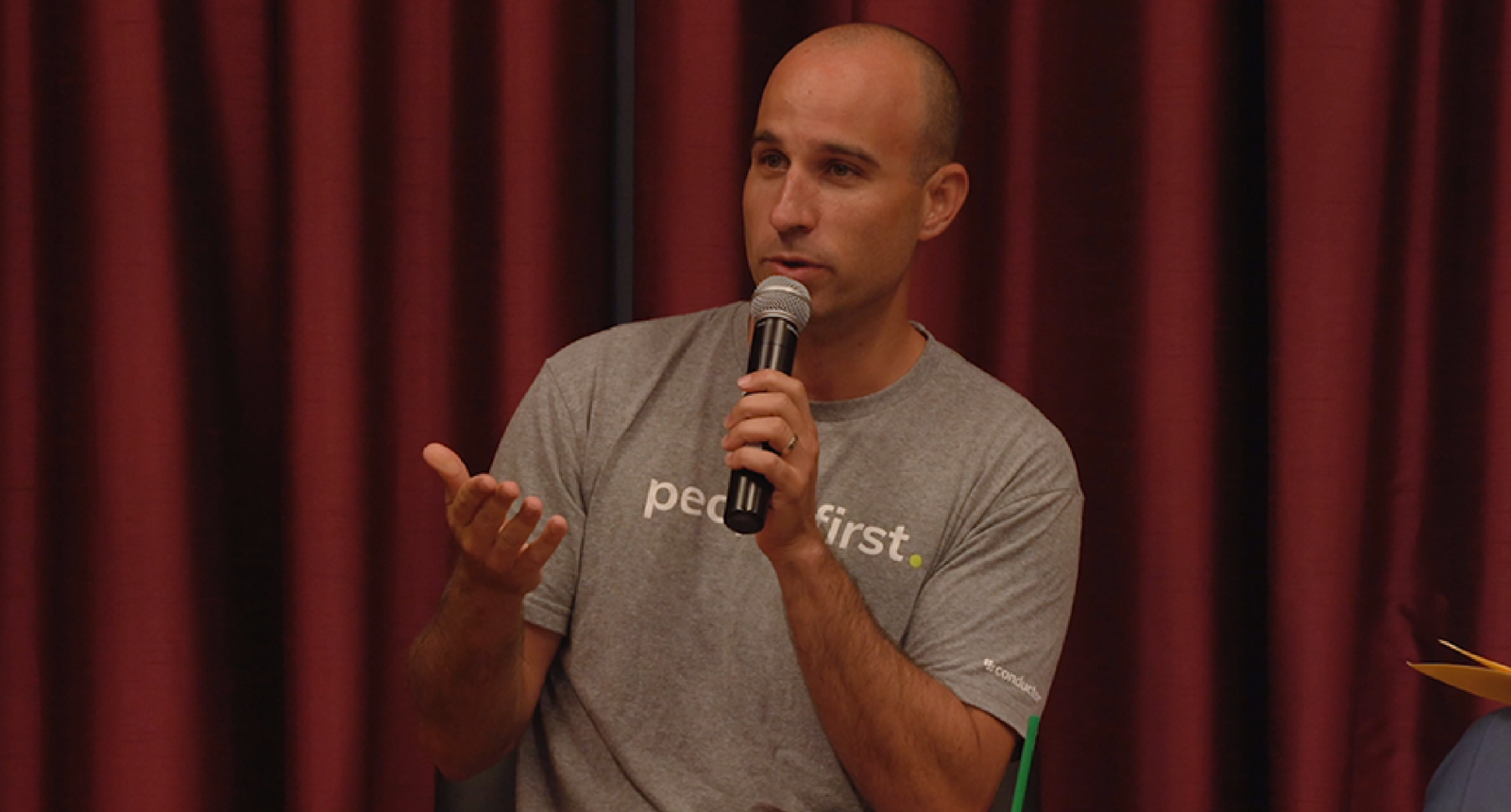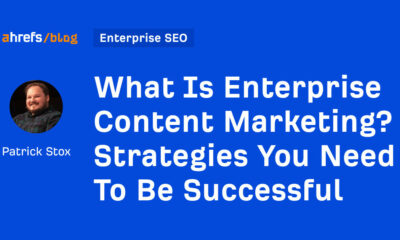SEO
Talking Google MUM & Enterprise Culture With Conductor’s CEO

We’re constantly hearing about new updates to Google’s algorithm, and some are more impactful than others. It can be difficult to separate the buzz from actionable insight.
This past year, Google’s unveiling of MUM created quite a stir, and it’s no wonder. Google itself says MUM is 1000x more powerful than BERT.
But what does that mean in real terms for your enterprise SEO strategy?
And what other underutilized facets of enterprise SEO can brands look to capitalize on in the months ahead?
I was fortunate to grab some time with Seth Besmertnik, CEO of Conductor, recently to discuss MUM and other upcoming enterprise SEO opportunities.
Besmertnik has been in the enterprise space a long time, first co-founding Conductor as a marketing services firm in 2006.
In 2010, Conductor began its evolution into the enterprise technology brand we know today with the launch of its SaaS product, Searchlight.
Today, Searchlight is a cloud-based content and SEO platform used by over 450 enterprise brands to improve organic search performance.
And Besmertnik is a busy man, what with having rebuilt his company after WeWork acquired it and then collapsed, as well as recently closing a $150 million round of funding for Conductor.
Below, he shares his insights on how enterprise marketers can prepare for MUM, where new opportunities exist, and what Conductor has been up to lately.
1. Getting Ready for MUM
Miranda Miller: “Google’s introduction to MUM caused a lot of buzz in the industry this past year. What should enterprise marketers do now to prepare for MUM and other search updates?”
Seth Besmertnik: “There are four things marketers can do to prepare.”
When building content, consider the searcher’s journey and intent.
“MUM is all about the interest and intent behind the inquiry.
With MUM, we are able to process huge amounts of data and relate it to connected topics in seconds, in comparison to the weeks it used to take.
Put yourself in the searcher’s shoes and assess related questions and topics they may have when starting their search journey or when preparing to buy.
This is no longer about exact keywords – we have to anticipate needs and think holistically about what the searcher is pursuing.”
Drive a multimedia SEO approach.
“As MUM seeks to grow visual search, video, and Lens, having a multimedia content strategy is vital to stay relevant in search results.
Think about optimizing your entire digital presence – including images, videos, and audio files – and not just your website to boost your brand.
Strengthen your written content and have descriptive tags so Google can best recognize and interpret your information.”
Evaluate the new language features.
“MUM can analyze search content in over 75 languages, breaking down language barriers and bridging the gap between your content and new markets.
To maximize this opportunity if you are working in multiple markets, incorporate multilingual SEO as part of your content strategy by focusing on location-based priorities and local interests.”
Focus on tried-and-true SEO best practices.
“User experience is at the heart of MUM.
The better Google can evaluate your site and get relevant results to users, the more opportunities your content will have to rank.
Ensure your site is optimized, healthy, and using ethical, white-hat techniques.
Don’t underestimate the power of reliable authoritative, high-quality written content like blogs and articles, as MUM will rely on these to deliver the most relevant content to users.”
2. Discovering Untapped Enterprise Opportunities
Miranda Miller: “Which facets of enterprise SEO are underutilized and present the best opportunities for brands?”
Seth Besmertnik: “If you have a local component to your business, local SEO is a great area of opportunity this year. Sometimes we err on casting too wide of a net, while local SEO can have lower competition and higher conversion.
Searchers expect fast, specific, and relevant content. Be what they are looking for. Find local keywords to target and revamp your page to serve these search terms.
Create specific content for each region that you conduct business.
Right now, we are also seeing a growing demand for real-time site auditing, monitoring, and alerts.
Marketers want to know what’s going on with their sites at any given moment – and not risk finding out about an issue weeks or months too late.
We want to have the most up-to-date information now. Thankfully, recent technologies lean into that to deliver insights quickly.”
3. How AI Is Changing Search
Miranda Miller: “What are some of the more unique or exciting ways you’re seeing AI being used in SEO and marketing?”
Seth Besmertnik: “MUM has been such an exciting advancement for search because of the sheer volume of data it can process in seconds. Its impact has already been demonstrated through improved searches for vaccine information.
This is just the beginning of the transformation of how critical and timely information is exchanged; it’s truly exciting.
Another interesting AI improvement to the search experience is Passage Ranking, where Google delves into your content, identifies a question or specific point in your query, and retrieves a highlighted passage for review.
Passage ranking makes search faster as you are presented with highlighted answers quickly, and no longer have to hunt for content on a page.”
4. Optimizing Your Company Culture
Miranda Miller: “The Conductor Foundation has long been an extension of your organization, and I see that you created an Ethics Committee internally a few years ago, as well.
What tips do you have for leaders looking to improve their company culture?”
Seth Besmertnik: “I have three tips for leaders to consider as they aim to improve company culture.”
Make space for everyone to be heard.
“When we initially explored what our Customer Policy would be, we invited all Conductors to raise their hands to join the discussion.
From there, we hosted small group talks led by a facilitator to maximize the chances for people to truly express their thoughts and be heard, and to ensure that no one voice dominated the conversation.”
Optimize for diversity of thought.
“When we broke out into smaller discussions, we didn’t want echo chambers.
We surveyed people to understand their sentiments.
Using those results, we balanced each group with a mix of people with diverse viewpoints to foster healthy and effective dialogue.”
Don’t boil the ocean.
“Start small and understand that building a strong ethical culture is a continuous and evolving process.
Our initial Customer Policy is just a starting point, and we have made that clear to our organization.
Use surveys and employee feedback channels to determine which issues are most important to your employees – and then start working with them to address those priorities.”
5. What’s Next For Conductor?
Miranda Miller: “Conductor recently raised $150M in your first round of funding, making you an independent startup once again.
What can you tell us about your company’s goals and what your users should expect of Conductor in the year ahead?”
Seth Besmertnik: “This is a major milestone for our entire industry, not just Conductor.
For much of the last decade, SEO has been both underfunded by the investment community and in marketing budgets.
Things are changing. Companies realize there is no more important marketing investment than getting found organically in unpaid channels like Google and YouTube and, as such, investors are following.
This funding will enable Conductor to keep the pedal to the metal on innovation and develop new products. It will create opportunities for us to pursue M&A and bring a better platform to our customers.
And, most importantly, it will enable Conductor to pursue our mission of empowering brands to transform their wisdom into marketing that helps people.”
More resources:
Featured Image: Courtesy of Conductor
SEO
Google Declares It The “Gemini Era” As Revenue Grows 15%

Alphabet Inc., Google’s parent company, announced its first quarter 2024 financial results today.
While Google reported double-digit growth in key revenue areas, the focus was on its AI developments, dubbed the “Gemini era” by CEO Sundar Pichai.
The Numbers: 15% Revenue Growth, Operating Margins Expand
Alphabet reported Q1 revenues of $80.5 billion, a 15% increase year-over-year, exceeding Wall Street’s projections.
Net income was $23.7 billion, with diluted earnings per share of $1.89. Operating margins expanded to 32%, up from 25% in the prior year.
Ruth Porat, Alphabet’s President and CFO, stated:
“Our strong financial results reflect revenue strength across the company and ongoing efforts to durably reengineer our cost base.”
Google’s core advertising units, such as Search and YouTube, drove growth. Google advertising revenues hit $61.7 billion for the quarter.
The Cloud division also maintained momentum, with revenues of $9.6 billion, up 28% year-over-year.
Pichai highlighted that YouTube and Cloud are expected to exit 2024 at a combined $100 billion annual revenue run rate.
Generative AI Integration in Search
Google experimented with AI-powered features in Search Labs before recently introducing AI overviews into the main search results page.
Regarding the gradual rollout, Pichai states:
“We are being measured in how we do this, focusing on areas where gen AI can improve the Search experience, while also prioritizing traffic to websites and merchants.”
Pichai reports that Google’s generative AI features have answered over a billion queries already:
“We’ve already served billions of queries with our generative AI features. It’s enabling people to access new information, to ask questions in new ways, and to ask more complex questions.”
Google reports increased Search usage and user satisfaction among those interacting with the new AI overview results.
The company also highlighted its “Circle to Search” feature on Android, which allows users to circle objects on their screen or in videos to get instant AI-powered answers via Google Lens.
Reorganizing For The “Gemini Era”
As part of the AI roadmap, Alphabet is consolidating all teams building AI models under the Google DeepMind umbrella.
Pichai revealed that, through hardware and software improvements, the company has reduced machine costs associated with its generative AI search results by 80% over the past year.
He states:
“Our data centers are some of the most high-performing, secure, reliable and efficient in the world. We’ve developed new AI models and algorithms that are more than one hundred times more efficient than they were 18 months ago.
How Will Google Make Money With AI?
Alphabet sees opportunities to monetize AI through its advertising products, Cloud offerings, and subscription services.
Google is integrating Gemini into ad products like Performance Max. The company’s Cloud division is bringing “the best of Google AI” to enterprise customers worldwide.
Google One, the company’s subscription service, surpassed 100 million paid subscribers in Q1 and introduced a new premium plan featuring advanced generative AI capabilities powered by Gemini models.
Future Outlook
Pichai outlined six key advantages positioning Alphabet to lead the “next wave of AI innovation”:
- Research leadership in AI breakthroughs like the multimodal Gemini model
- Robust AI infrastructure and custom TPU chips
- Integrating generative AI into Search to enhance the user experience
- A global product footprint reaching billions
- Streamlined teams and improved execution velocity
- Multiple revenue streams to monetize AI through advertising and cloud
With upcoming events like Google I/O and Google Marketing Live, the company is expected to share further updates on its AI initiatives and product roadmap.
Featured Image: Sergei Elagin/Shutterstock
SEO
brightonSEO Live Blog

Hello everyone. It’s April again, so I’m back in Brighton for another two days of Being the introvert I am, my idea of fun isn’t hanging around our booth all day explaining we’ve run out of t-shirts (seriously, you need to be fast if you want swag!). So I decided to do something useful and live-blog the event instead.
Follow below for talk takeaways and (very) mildly humorous commentary. sun, sea, and SEO!
SEO
Google Further Postpones Third-Party Cookie Deprecation In Chrome

Google has again delayed its plan to phase out third-party cookies in the Chrome web browser. The latest postponement comes after ongoing challenges in reconciling feedback from industry stakeholders and regulators.
The announcement was made in Google and the UK’s Competition and Markets Authority (CMA) joint quarterly report on the Privacy Sandbox initiative, scheduled for release on April 26.
Chrome’s Third-Party Cookie Phaseout Pushed To 2025
Google states it “will not complete third-party cookie deprecation during the second half of Q4” this year as planned.
Instead, the tech giant aims to begin deprecating third-party cookies in Chrome “starting early next year,” assuming an agreement can be reached with the CMA and the UK’s Information Commissioner’s Office (ICO).
The statement reads:
“We recognize that there are ongoing challenges related to reconciling divergent feedback from the industry, regulators and developers, and will continue to engage closely with the entire ecosystem. It’s also critical that the CMA has sufficient time to review all evidence, including results from industry tests, which the CMA has asked market participants to provide by the end of June.”
Continued Engagement With Regulators
Google reiterated its commitment to “engaging closely with the CMA and ICO” throughout the process and hopes to conclude discussions this year.
This marks the third delay to Google’s plan to deprecate third-party cookies, initially aiming for a Q3 2023 phaseout before pushing it back to late 2024.
The postponements reflect the challenges in transitioning away from cross-site user tracking while balancing privacy and advertiser interests.
Transition Period & Impact
In January, Chrome began restricting third-party cookie access for 1% of users globally. This percentage was expected to gradually increase until 100% of users were covered by Q3 2024.
However, the latest delay gives websites and services more time to migrate away from third-party cookie dependencies through Google’s limited “deprecation trials” program.
The trials offer temporary cookie access extensions until December 27, 2024, for non-advertising use cases that can demonstrate direct user impact and functional breakage.
While easing the transition, the trials have strict eligibility rules. Advertising-related services are ineligible, and origins matching known ad-related domains are rejected.
Google states the program aims to address functional issues rather than relieve general data collection inconveniences.
Publisher & Advertiser Implications
The repeated delays highlight the potential disruption for digital publishers and advertisers relying on third-party cookie tracking.
Industry groups have raised concerns that restricting cross-site tracking could push websites toward more opaque privacy-invasive practices.
However, privacy advocates view the phaseout as crucial in preventing covert user profiling across the web.
With the latest postponement, all parties have more time to prepare for the eventual loss of third-party cookies and adopt Google’s proposed Privacy Sandbox APIs as replacements.
Featured Image: Novikov Aleksey/Shutterstock
-

 PPC7 days ago
PPC7 days ago19 Best SEO Tools in 2024 (For Every Use Case)
-
SEARCHENGINES6 days ago
Daily Search Forum Recap: April 19, 2024
-
SEARCHENGINES7 days ago
Daily Search Forum Recap: April 18, 2024
-

 WORDPRESS6 days ago
WORDPRESS6 days agoHow to Make $5000 of Passive Income Every Month in WordPress
-

 WORDPRESS5 days ago
WORDPRESS5 days ago13 Best HubSpot Alternatives for 2024 (Free + Paid)
-

 SEO7 days ago
SEO7 days ago25 WordPress Alternatives Best For SEO
-

 WORDPRESS6 days ago
WORDPRESS6 days ago7 Best WooCommerce Points and Rewards Plugins (Free & Paid)
-

 MARKETING6 days ago
MARKETING6 days agoBattling for Attention in the 2024 Election Year Media Frenzy
















You must be logged in to post a comment Login